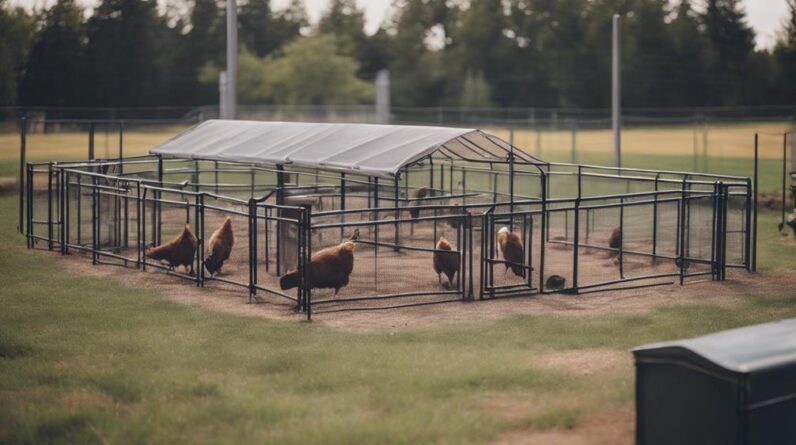
Ensuring the well-being of emus in farming settings involves implementing a series of guidelines to promote their health and comfort.
But have you ever considered the impact of these practices on the broader ecosystem?
By prioritizing emu welfare in farming operations, a ripple effect of positive outcomes may extend beyond just the emus themselves.
Stay tuned to uncover the interconnected web of benefits that comprehensive emu welfare measures can bring to the agricultural landscape.
Key Takeaways
- Design spacious shelters with environmental enrichment for emus' physical and mental well-being.
- Regular health checks and weight monitoring are crucial for ensuring emus' overall health.
- Selective breeding, reproductive health monitoring, and stress-free environments promote successful emu reproduction.
- Implement farm safety measures, predator prevention, and welfare standards for optimal emu farming operations.
Emu Housing Requirements
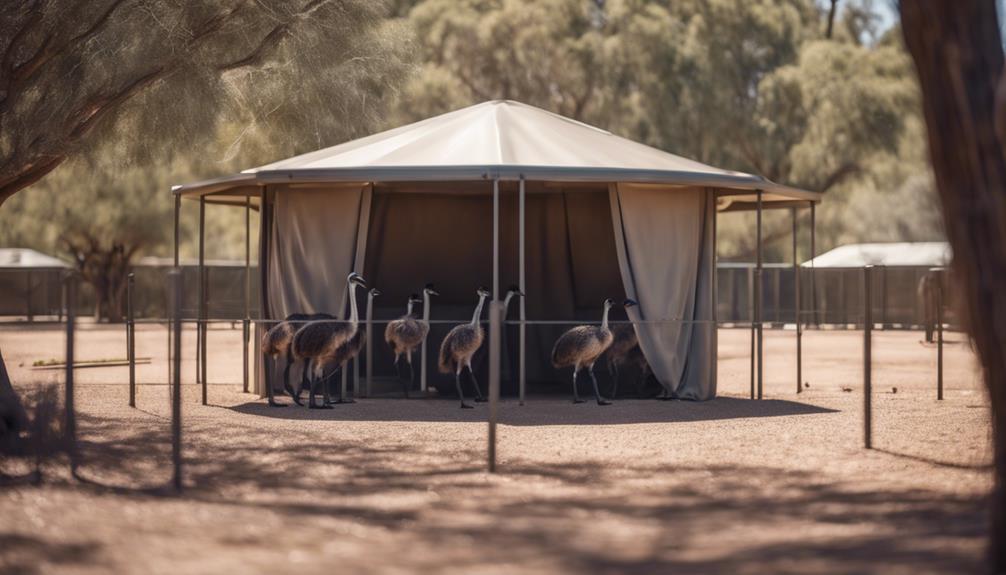
When designing housing for emus in farming operations, consider providing ample space for movement and social interaction to ensure their well-being. Emu shelter design is crucial for their health and happiness. Emus are social creatures that thrive in environments where they can interact with others. Adequate space allows them to exercise and exhibit natural behaviors. Emu shelters should be well-maintained to prevent injuries and ensure a safe living space. Regular cleaning and inspections are necessary to remove any hazards that could harm the emus.
In addition to space considerations, implementing environmental enrichment strategies is essential to promote mental stimulation and prevent boredom. Emus benefit from objects like balls, logs, or hanging toys that encourage natural behaviors such as pecking and exploring. These enrichments help reduce stress and improve overall well-being.
When designing emu housing, remember that a well-thought-out environment contributes significantly to their welfare. Proper shelter design and maintenance, along with enrichment strategies, are key components in ensuring the health and happiness of emus on the farm.
Proper Nutrition for Emus
Emus' nutritional requirements play a critical role in maintaining their health and well-being on the farm. To ensure your emus receive the necessary nutrients, consider the following:
- Feeding Schedules: Establish a consistent feeding schedule for your emus. Offer feed in the morning and late afternoon to mimic their natural foraging behavior.
- Nutritional Balance: Provide a well-balanced diet rich in proteins, fiber, vitamins, and minerals. Emus require a diet low in fat to prevent obesity and related health issues.
- Dietary Supplements: Consult with a veterinarian to determine if your emus require any specific dietary supplements. These supplements can help address any deficiencies in their diet.
- Feeding Methods: Implement feeding methods that encourage natural behaviors. Scatter feed on the ground to stimulate foraging and provide environmental enrichment.
Emu Health Monitoring Guidelines
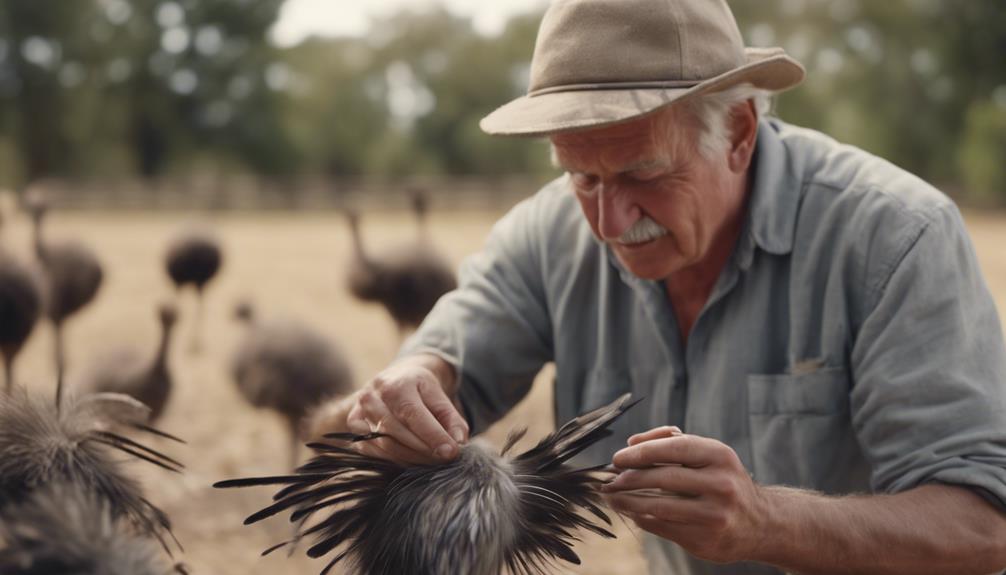
Regularly monitoring the health of your emus is essential for ensuring their well-being and early detection of any potential issues. Emu health tracking and monitoring are crucial aspects of responsible farming practices. By implementing thorough health monitoring guidelines, you can actively participate in emu disease prevention and management, ensuring a healthy flock.
Emu Health Monitoring Guidelines
| Aspect | Frequency | Importance |
|---|---|---|
| Physical Examination | Monthly | Detect early signs of illness or injury |
| Weight Tracking | Weekly | Monitor growth and detect any sudden changes |
| Parasite Checks | Bi-annually | Prevent infestations and ensure parasite control |
Implementing Emu Enrichment Activities
To enhance the welfare and mental stimulation of emus in farming operations, incorporating enriching activities is crucial for promoting their overall well-being and natural behaviors. Emu enrichment programs are designed to provide environmental stimuli and encourage behavioral diversity, ensuring the emus' physical and psychological needs are met.
Here are some ways to implement enriching activities for emus:
- Social Interactions: Emus are social animals that thrive in groups. Encouraging social interactions among emus through shared spaces and activities can help reduce stress and promote natural behaviors.
- Environmental Stimuli: Providing emus with different environmental stimuli such as novel objects, varied terrain, and visual barriers can keep them engaged and mentally stimulated.
- Foraging Opportunities: Emus are natural foragers. Offering opportunities for them to search for food through scatter feeding or puzzle feeders can mimic their natural feeding behaviors.
- Toys and Structures: Introducing toys and structures like balls, hanging objects, and shelters can offer emus physical and mental challenges, promoting exercise and problem-solving skills.
Emu Handling Best Practices

When handling emus in farming operations, it is essential to adhere to best practices to ensure their welfare and minimize stress. Emus are sensitive animals that respond to human interactions and environments. Understanding emu behavior and communication signals is crucial in developing effective handling techniques. By recognizing signs of distress or discomfort, you can adjust your approach to create a more positive experience for the emus and yourself.
Emu Handling Best Practices
| Emu Behavior | Communication Signals | Effective Techniques |
|---|---|---|
| Calm Demeanor | Soft vocalizations | Approach slowly and calmly |
| Alert Posture | Ruffling feathers | Maintain a safe distance |
| Agitated Movements | Loud squawking | Give emus space and time |
| Curious Exploration | Head bobbing | Use positive reinforcement |
Ensuring Emu Safety on Farms
Ensuring the safety of emus on farms requires a thorough understanding of their behavioral patterns and environmental needs. To create a secure environment for these unique birds, consider the following:
- Emu Habitat Design: Emus need ample space to roam and run. Fences should be sturdy and high enough to prevent escapes, with no sharp edges that could injure them.
- Predator Prevention: Implement measures like secure enclosures and regular patrols to deter predators such as foxes or feral dogs which pose a threat to emus.
- Emu Stress Management: Minimize stressors like loud noises or sudden movements. Allow emus to have quiet areas for retreat if they feel overwhelmed.
- Socialization Strategies: Emus are social animals; ensure they have companionship to prevent loneliness, which can lead to stress-related issues.
Emu Behavioral Needs
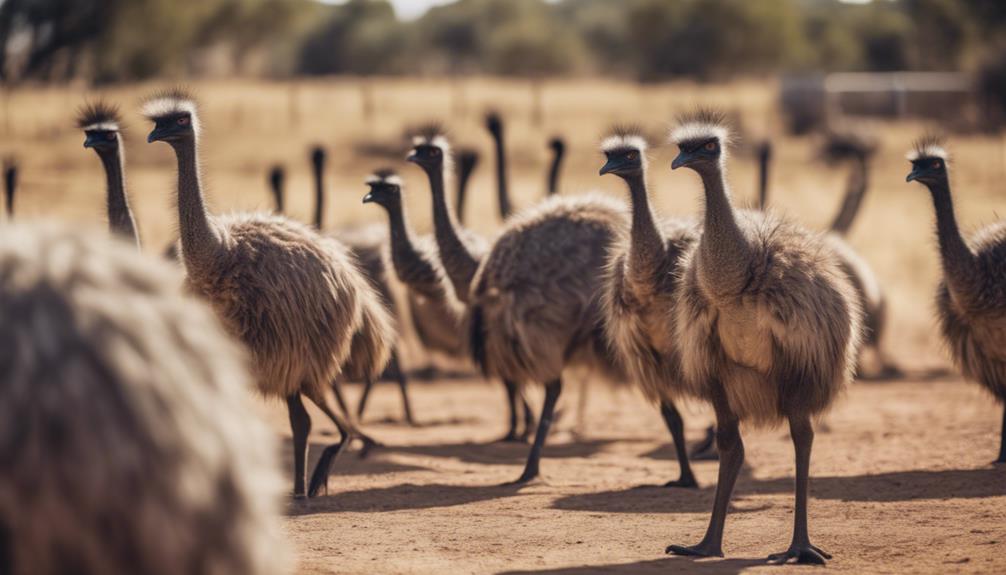
Understanding the behavioral needs of emus is crucial for ensuring their well-being and optimizing their welfare in farming operations. Emus are social creatures that thrive in groups, emphasizing the importance of meeting their socialization needs. Providing emus with companionship and space to interact with others is essential for their mental and emotional health. Moreover, emus have specific exercise requirements to maintain their physical well-being. Enclosures should be spacious enough to allow emus to move around freely, run, and stretch their legs, mimicking their natural behaviors in the wild.
Emus also require stress management strategies to prevent negative impacts on their overall welfare. Factors such as loud noises, overcrowding, or sudden changes in their environment can induce stress in emus. Recognizing and mitigating these stressors is vital for maintaining a harmonious and healthy environment for the birds. By understanding and addressing the socialization needs, exercise requirements, stress management, and natural behaviors of emus, farmers can ensure the well-being and welfare of these unique animals in farming operations.
Emu Breeding Considerations
To optimize the breeding process of emus in farming operations, meticulous attention to genetic diversity and reproductive health is imperative. When it comes to emu breeding management, focusing on these key aspects can enhance the overall success and welfare of the emu population:
- Selective Breeding: By selecting breeding pairs based on diverse genetic backgrounds, you can help maintain a healthy gene pool and reduce the risk of genetic disorders within the emu population.
- Breeding Records: Keeping detailed records of breeding dates, parentage, and health status can aid in monitoring the reproductive success of emus and identifying any potential issues early on.
- Reproductive Health Monitoring: Regular health checks, such as assessing fertility and ensuring proper nutrition, are essential in supporting the reproductive capabilities of emus and promoting successful breeding outcomes.
- Breeding Environment: Providing a stress-free and suitable breeding environment, including adequate nesting areas and minimal disturbances, can encourage natural breeding behaviors and increase the likelihood of successful reproduction.
Emu Veterinary Care Tips
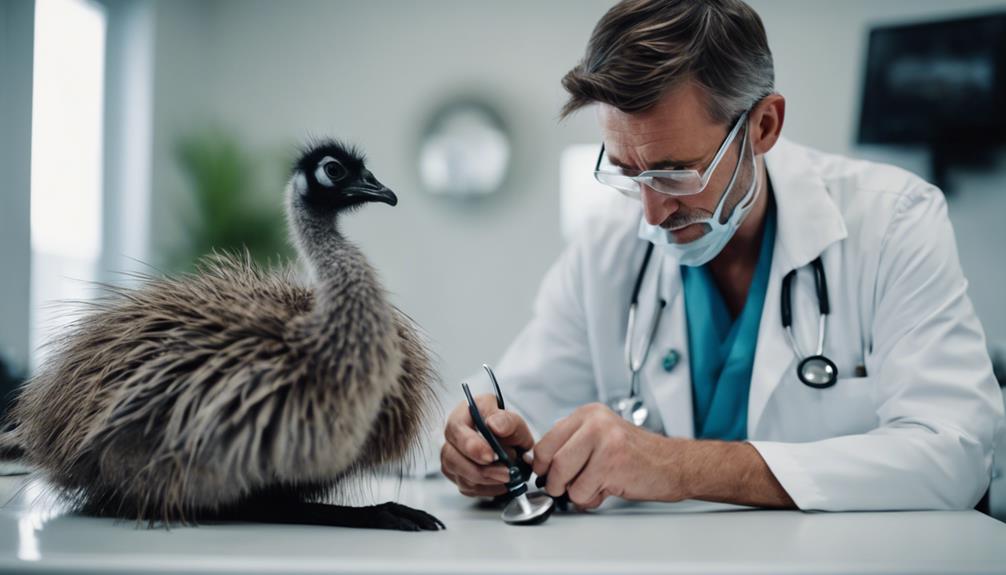
Proper veterinary care plays a crucial role in ensuring the health and well-being of emus in farming operations. Emus, like any other livestock, require regular veterinary attention to thrive. Here are some essential veterinary care tips to keep your emus healthy:
| Veterinary Care Tips | Description | Importance |
|---|---|---|
| Emu Wound Care | Clean and dress wounds promptly to prevent infection. | Prevents illness |
| Emu Parasite Prevention | Implement a regular deworming schedule to control parasites. | Maintains health |
| Emu Vaccination Schedule | Follow a vaccination plan to protect against common diseases. | Prevents illnesses |
| Emu Emergency Response | Have an emergency plan in place for quick and effective action. | Ensures rapid care |
| Regular Health Checks | Conduct routine health check-ups to monitor emu well-being. | Early disease detection |
Emu Transportation Protocols
Emus should be transported following strict protocols to ensure their safety and well-being during transit. Proper handling and transportation safety measures are crucial to minimize transport stress and uphold animal welfare. Here are four essential guidelines for ensuring the welfare of emus during transportation:
- Emu Handling: Emus should be calmly and gently herded into the transport vehicle to avoid causing unnecessary stress. Rough handling can lead to injuries and distress, impacting the overall well-being of the birds.
- Transportation Safety: Ensure that the transport vehicle is well-ventilated, free from sharp edges, and equipped with non-slip flooring. Emus should have enough space to stand comfortably and move around during the journey.
- Temperature Regulation: Emus are sensitive to temperature extremes. Maintain a suitable temperature inside the transport vehicle to prevent heat stress or hypothermia, especially during long journeys.
- Regular Monitoring: Assign a knowledgeable individual to oversee the emus during transportation. Regularly check on the birds' condition, provide water if needed, and address any signs of distress promptly to ensure their welfare throughout the journey.
Emu Welfare Assessments
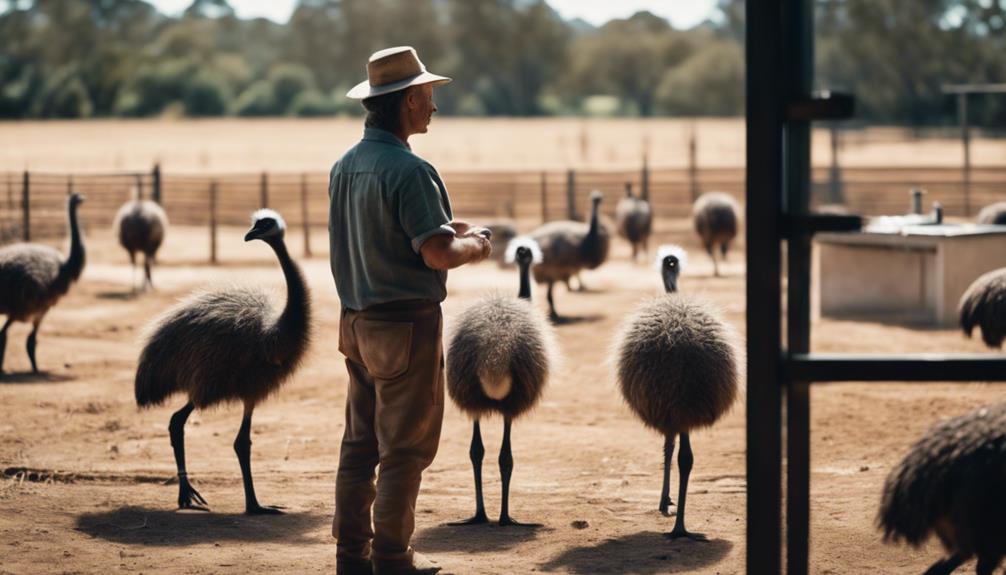
Effective assessment of emu welfare in farming operations requires meticulous observation and data analysis to ensure optimal care standards are met. Emu socialization techniques play a crucial role in welfare assessments. Emus are social birds that thrive in groups; monitoring their interactions can provide insights into their well-being. Emus exhibit stress through behaviors like pacing or feather plucking. To address this, emu stress management strategies such as providing enriching environments with hiding spots or natural materials to peck at can be implemented.
Assessing emu welfare also involves evaluating their physical health, including body condition, feather quality, and overall demeanor. Regular veterinary check-ups are essential to detect any health issues promptly. By combining behavioral observations with physical assessments, farmers can gain a comprehensive understanding of their emus' welfare status. This detailed approach ensures that the welfare of emus in farming operations remains a top priority.
Emu Welfare Certification Programs
When considering the welfare of emus in farming operations, certification programs are essential for ensuring industry standards and best practices are met. These programs establish welfare standards and conduct thorough auditing processes to guarantee that emus are raised in environments that prioritize their health and well-being.
To provide you with a clearer understanding, here are four key points regarding emu welfare certification programs:
- Welfare Standards: Certification programs set specific welfare standards that farms must adhere to, covering aspects such as housing conditions, feeding practices, and medical care.
- Auditing Process: Regular audits are conducted to assess compliance with industry guidelines and ensure that emus are being treated ethically and in accordance with welfare regulations.
- Industry Guidelines: These programs outline industry-specific guidelines that farms must follow to receive certification, promoting consistency and accountability across the sector.
- Certification Requirements: Farms seeking certification must meet stringent requirements related to emu care, handling, and overall welfare to obtain and maintain certification status.
Frequently Asked Questions
How Do Emus Communicate With Each Other in a Farming Setting?
Emus communicate in farming settings through vocalizations and body language. They establish a pecking order and dominance hierarchy, using sounds and gestures to convey their intentions and establish social structures essential for their well-being.
Are There Any Specific Regulations or Guidelines Regarding the Social Interactions of Emus on Farms?
When it comes to social dynamics and emu behavior on farms, specific regulations or guidelines may not exist. Emus naturally communicate through sounds and body language, adapting to the farming environment as they interact with each other.
What Are Some Common Behavioral Issues That Emus May Exhibit on Farms and How Can They Be Addressed?
When dealing with common behavioral issues in emus on farms, consider implementing behavioral enrichment activities and positive training methods. These approaches can enhance emu welfare, reduce stress levels, and promote healthier social interactions among the birds.
Can Emus Experience Stress or Anxiety in a Farming Environment, and if So, How Can This Be Minimized?
To minimize stress in emus on farms, focus on enrichment activities and stress management techniques. Regular welfare assessments and behavioral training can help address anxiety. Emphasize a safe and stimulating environment to ensure their well-being.
Are There Any Specific Training Methods or Techniques That Can Be Used to Improve the Welfare of Emus on Farms?
To improve emu welfare on farms, consider utilizing positive reinforcement training techniques. By understanding emu behavior and employing effective communication methods, you can create a supportive environment that enhances their well-being and minimizes stress.
Conclusion
In conclusion, ensuring the welfare of emus in farming operations is crucial for their health and overall well-being. Just as a well-tuned engine runs smoothly, proper housing, nutrition, health monitoring, enrichment activities, handling practices, veterinary care, transportation protocols, and welfare assessments are essential components of responsible emu farming.
By following these guidelines, you can ensure that your emus thrive like a finely tuned instrument in a symphony of animal welfare.





